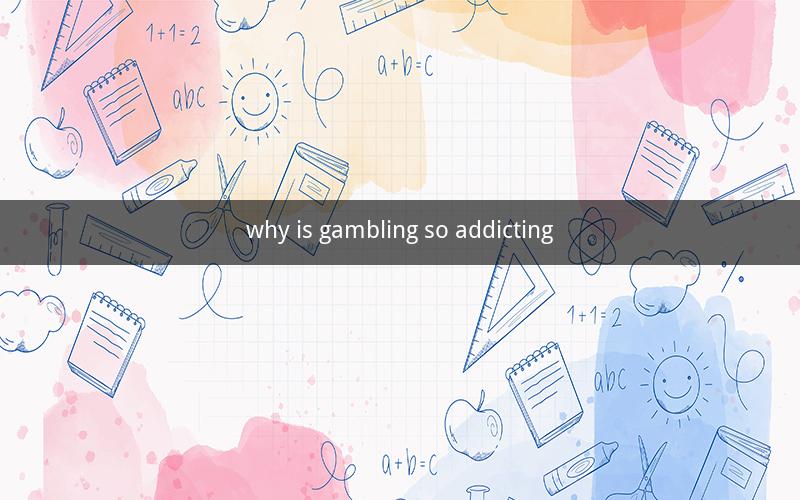
Contents
1. Understanding the Psychology of Addiction
2. The Role of Dopamine in Gambling Addiction
3. The Social and Economic Impact of Gambling
4. How the Environment Contributes to Gambling Addiction
5. Preventing and Treating Gambling Addiction
Understanding the Psychology of Addiction
Gambling addiction, also known as problem gambling or pathological gambling, is a complex disorder that affects individuals emotionally, physically, and financially. The reasons behind its addictive nature can be traced back to various psychological factors.
One of the key factors is the release of dopamine, a neurotransmitter responsible for pleasure and reward. When individuals gamble, the brain's reward system is activated, leading to the release of dopamine. This creates a feeling of euphoria and satisfaction, making gambling a pleasurable activity.
However, the problem arises when individuals develop a tolerance to this reward, leading them to seek more intense and risky gambling experiences to achieve the same level of pleasure. This cycle of seeking increased stimulation can quickly spiral out of control, leading to addiction.
The Role of Dopamine in Gambling Addiction
Dopamine plays a crucial role in the development of gambling addiction. As mentioned earlier, dopamine is released when individuals engage in gambling activities. This release creates a sense of pleasure and satisfaction, making gambling an enjoyable experience.
However, with repeated exposure to gambling, the brain becomes accustomed to the release of dopamine, leading to tolerance. This tolerance forces individuals to seek higher levels of risk and reward to achieve the same pleasurable sensations. Over time, this can lead to a compulsive need to gamble, even when it has negative consequences.
The Social and Economic Impact of Gambling
Gambling addiction not only affects individuals but also has significant social and economic implications. The economic cost of gambling addiction can be substantial, as individuals may lose substantial amounts of money on gambling activities. This can lead to financial problems, including debt and bankruptcy.
On the social front, gambling addiction can strain relationships, leading to divorce, family conflicts, and social isolation. The emotional and psychological toll of gambling addiction can also have long-lasting effects on individuals and their loved ones.
How the Environment Contributes to Gambling Addiction
The environment in which individuals gamble can also contribute to the development and exacerbation of gambling addiction. Factors such as the availability of gambling venues, marketing and advertising strategies, and the design of gambling games can all influence the likelihood of developing an addiction.
For example, casinos are designed to be immersive and exciting, with bright lights, loud music, and attractive promotions. These elements can create an environment that is conducive to gambling, making it easier for individuals to become addicted.
Preventing and Treating Gambling Addiction
Preventing and treating gambling addiction requires a multifaceted approach, involving both individual and societal efforts. Here are some strategies that can be effective:
1. Education and Awareness: Increasing awareness about the risks and consequences of gambling addiction can help individuals make informed decisions and seek help when needed.
2. Self-Exclusion Programs: Self-exclusion programs allow individuals to ban themselves from gambling venues, reducing the temptation to engage in risky behaviors.
3. Counseling and Therapy: Professional counseling and therapy can help individuals address the underlying psychological factors contributing to their addiction.
4. Support Groups: Support groups provide a platform for individuals to share their experiences and receive support from others who have faced similar challenges.
5. Regulatory Measures: Governments and regulatory bodies can implement measures to restrict access to gambling venues and promote responsible gambling practices.
Conclusion
Gambling addiction is a complex disorder with psychological, social, and economic implications. Understanding the factors contributing to its addictive nature, such as dopamine release and environmental influences, is crucial for effective prevention and treatment. By implementing strategies to increase awareness, promote responsible gambling, and provide support for those affected, we can work towards a society where gambling addiction is minimized.
Questions and Answers
1. What is the primary neurotransmitter responsible for the pleasure and reward associated with gambling?
- The primary neurotransmitter responsible for the pleasure and reward associated with gambling is dopamine.
2. How can self-exclusion programs help prevent gambling addiction?
- Self-exclusion programs help prevent gambling addiction by allowing individuals to ban themselves from gambling venues, reducing the temptation to engage in risky behaviors.
3. What is the economic cost of gambling addiction?
- The economic cost of gambling addiction can be substantial, including financial problems such as debt and bankruptcy.
4. How can professional counseling and therapy help in treating gambling addiction?
- Professional counseling and therapy can help individuals address the underlying psychological factors contributing to their addiction, promoting healing and recovery.
5. What role do environmental factors play in the development of gambling addiction?
- Environmental factors, such as the availability of gambling venues and the design of gambling games, can contribute to the development and exacerbation of gambling addiction.
6. What are some effective strategies for preventing gambling addiction?
- Effective strategies for preventing gambling addiction include increasing awareness, promoting responsible gambling, and providing support for those affected.
7. How can support groups help individuals dealing with gambling addiction?
- Support groups provide a platform for individuals to share their experiences and receive support from others who have faced similar challenges, promoting healing and recovery.
8. What regulatory measures can be implemented to promote responsible gambling?
- Regulatory measures that can be implemented to promote responsible gambling include restricting access to gambling venues and enforcing responsible gambling practices.
9. How can governments and regulatory bodies address the social and economic implications of gambling addiction?
- Governments and regulatory bodies can address the social and economic implications of gambling addiction by implementing policies to increase awareness, promote responsible gambling, and provide support for those affected.
10. What is the long-term impact of gambling addiction on individuals and their loved ones?
- The long-term impact of gambling addiction on individuals and their loved ones can be significant, including strained relationships, financial problems, and emotional and psychological tolls.